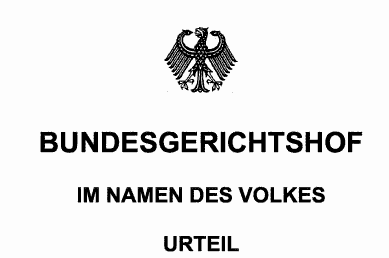The III Civil Senate of the German Federal Supreme Court today ruled on the question of whether the state is liable for a professional musician’s loss of income caused by temporary and graduated event bans and restrictions ordered to combat the SARS-CoV-2 virus in the period from March to July 2020 (“first lockdown”).
Facts:
The plaintiff, who is based in the Free State of Bavaria, operates a music and film production company and is the leader of a music group. More than 90 percent of his assignments consist of live performances. He is seeking compensation from the defendant state of Baden-Württemberg for loss of income that he incurred in the period from March to July 2020 because he and his music group were unable to perform at events due to government measures to combat the SARS-CoV-2 coronavirus and the COVID-19 disease caused by it.
The defendant state issued from March 17, 2020 on the basis of § 32 in conjunction with. § 28 para. 1 of the Infection Protection Act (IfSG) successively introduced several regulations to combat the coronavirus. The initially ordered general ban on meetings and events was subsequently relaxed. As of June 1, 2020, cultural events of any kind under 100 attendees were again permitted, subject to certain safeguards and sanitary measures. As of July 1, 2020, up to 250 attendees were allowed at events with fixed seating and a predetermined program.
Process history:
The Regional Court dismissed the action for payment of €8,326.48 plus interest. The plaintiff’s appeal was unsuccessful before the Higher Regional Court.
The decision of the Federal Supreme Court:
In the appeal proceedings, the plaintiff primarily pursued a claim for compensation under the judicial liability institute of expropriation-like intervention. The Third Civil Senate dismissed the plaintiff’s appeal.
A claim for compensation due to expropriation-like encroachment presupposes that there has been unlawful encroachment on a right protected by Art. 14 para. This is a direct interference with the legal position protected by Article 1 of the Basic Law and imposes on the beneficiary a special sacrifice for the general public that is not expected of others. These conditions are not met here. The event bans and restrictions ordered in the defendant county’s Corona ordinances were not unlawful. In particular, they are consistent with Art. 12 para. 1 and Art. 14 para. 1 GG compatible.
The event bans and restrictions did indeed interfere with the plaintiff’s business operations as property within the meaning of Article 14 of the German Basic Law, since the plaintiff was temporarily prevented or only able to a limited extent to use the existing operating resources as intended and – according to his submission, which is to be assumed under the law of review – to take advantage of performance opportunities that had already been contractually agreed.
However, the event bans and restrictions ordered were proportionate. They served a constitutionally legitimate purpose because they aimed to slow the further spread of the virus by reducing interpersonal contact and to break the exponential growth of infections in order to avoid overburdening the health care system and to ensure medical care for the population. In its daily situation reports, the Robert Koch Institute has just also described “social distancing” as an appropriate countermeasure to the spread of the virus and the overloading of the health care system.
The temporary and graduated event bans and restrictions were also necessary because equally suitable, milder means were not available. Taking into account the broad scope of assessment to which it was entitled, the defendant country was entitled to assume in mid-March 2020 that it was important to prevent social contacts as quickly and comprehensively as possible in order to effectively counter the danger of an uncontrolled spread of the SARS-CoV-2 coronavirus and the associated threats to the life and health of the population and the functioning of the healthcare system. Differentiating transitional and exemption regulations were not compatible with the primary goal of the fastest possible and most comprehensive contact restrictions. Rules of conduct for meetings and events did not constitute an equally effective means, even if fully observed. In addition, there is the risk of consciously or unconsciously incorrect application of the rules (especially at events such as weddings, company parties and concerts at which the plaintiff’s music group performs).
The event bans and restrictions ordered by the defendant state in the period from March to July 2020 were also proportionate in the strict sense. For the period under review, the public authorities found a constitutional balance between the plaintiff’s impairment of his fundamental rights and the protection of particularly important public interests pursued by the ban on events. The measures ordered, including the ban on events, were limited in time from the beginning. From the outset, the legislator had an “exit strategy” in mind and pursued a gradual opening concept. A further mitigation of the interference in Art. 14 para. 1 sentence 1 GG brought about generous state aid programs. This included the “Corona emergency aid for microenterprises and solo self-employed” approved by the federal cabinet on March 23, 2020, which was available from March 25, 2020, under which companies with up to five employees that had experienced economic difficulties threatening their existence as a result of the Corona pandemic could receive financial support of up to €9,000, and which resulted in more than 240,000 approvals in Baden-Württemberg with a total volume of more than two billion euros. In addition, the Free State of Bavaria granted financial benefits of between €5,000 and €50,000 to companies, solo self-employed persons and members of the liberal professions based there, which was also available to the plaintiff, whose company headquarters are in Bavaria.
Insofar as the ordered event bans and restrictions at the same time infringe the plaintiff’s fundamental right under Article 12 para. 1 GG has been interfered with, nothing else applies. This does not change even if one takes into account the provisions of Art. 5 para. 3 GG additionally takes into account the freedom of art. In cases involving compensation for loss of income due to event bans and restrictions under infection control law, artistic freedom is affected not in its immaterial but in its pecuniary dimension, so that Art. 12 para. 1 GG is decisive.
The legislator of the Infection Protection Act was not constitutionally obligated to provide for burdens such as those imposed on the plaintiff by the content and restriction provisions contained in the event prohibitions and restrictions within the meaning of Art. 14 Para. 1 sentence 2 of the Basic Law to regulate compensation claims. The period during which the ban on events ordered by the defendant state had the de facto effect of a ban on operations for the plaintiff was only two and a half months. Thereafter, it was again possible for him to provide the services he offered to a limited extent. Such a period was not unreasonable for the plaintiff’s business operations, taking into account the entrepreneurial risk generally borne by the business owner.
Lower courts:
Stuttgart Regional Court – Judgment of February 26, 2021 – 7 O 285/20
Stuttgart Higher Regional Court – Judgment of February 23, 2022 – 4 U 70/21
The governing regulations are:
Art. 12 GG – Freedom of occupation
(1) All Germans shall have the right freely to choose their occupation, place of work and place of training. 2The practice of the profession may be regulated by or on the basis of a law.
Art. 14 GG – Property, Right of Inheritance and Expropriation
Ownership and inheritance rights are guaranteed. 2The content and limits shall be determined by the laws.
§ 28 IfSG – Protective measures
(1) If sick persons, persons suspected of being sick, persons suspected of being infected or excretors are detected or if it emerges that a deceased person was sick, suspected of being sick or excretors, the competent authority shall take the necessary protective measures, in particular those specified in Sections 28a, 28b and 29 to 31, to the extent and for as long as necessary to prevent the spread of communicable diseases; in particular, it may oblige persons not to leave the place where they are or only to leave it under certain conditions or not to enter places or public places designated by it or only to enter them under certain conditions. Under the conditions of sentence 1, the competent authority may restrict or prohibit events or other gatherings of people and close bathing establishments or communal facilities referred to in § 33 or parts thereof.
§ Section 32 IfSG – Issuance of legal ordinances
The governments of the Länder shall be authorized, subject to the conditions governing measures under Sections 28 to 28b and 29 to 31, also to enact by ordinances corresponding requirements and prohibitions for the control of communicable diseases. 2The state governments may amend the authorization by statutory order.


















